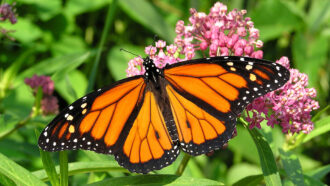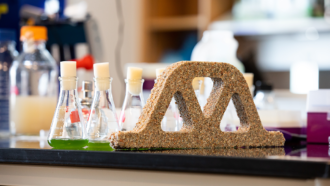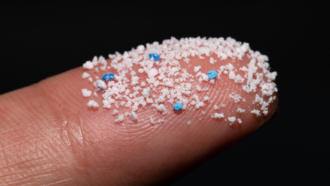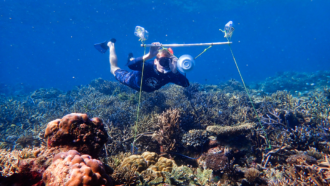HS-ESS3-4
Evaluate or refine a technological solution that reduces impacts of human activities on natural systems.
-
 Animals
AnimalsAre coyotes moving into your neighborhood?
How do coyotes survive in New York City, Los Angeles and Chicago? Researchers and citizen scientists are working together to find answers.
-
 Environment
EnvironmentPesticides contaminate most food of western U.S. monarchs
Monarch caterpillars eat only milkweeds. A new study finds widespread pesticide use has tainted these plants across the insect’s western U.S. breeding grounds.
-
 Environment
EnvironmentFossil fuels appear to release far more methane than we thought
Ice cores reveal less methane than expected. This suggests today’s fossil fuel industry is responsible for nearly all of the methane emissions from natural sources today.
-
 Science & Society
Science & SocietyCO2 emissions have nosedived as COVID-19 keeps people home
The COVID-19 pandemic restricted travel that can pollute the air. By April, travel-related daily emissions of greenhouse gases was back to 2006 levels.
-
 Materials Science
Materials ScienceThis ‘living’ concrete slurps up a greenhouse gas
Microbes help harden a mix of sand and gelatin into a living concrete that could interact with people and the environment in great new ways.
-
 Environment
EnvironmentLegos could last a disturbingly long time in the ocean
By looking at toys washed up on beaches, scientists have estimated how long it takes hard plastics to break down in the oceans. And it’s a long time.
-
 Environment
EnvironmentLaundry tweaks can help clothes last longer and pollute less
Clothes washed in cooler water and for less time shed less dye and fewer fibers, a new study finds. That’s better for clothes — and the environment.
-
 Chemistry
ChemistryConverting trash to valuable graphene in a flash
Flash heating of carbon-rich wastes creates graphene, which has many commercial uses.
-
 Animals
AnimalsDrones might one day capture a dolphin’s breath in midair
High-speed footage of dolphin spray reveals that droplets blast upward at speeds close to 100 kilometers per hour.
-
 Earth
EarthHelp for a world drowning in microplastics
Microplastic pollution in our oceans and lakes is a problem. Scientists are testing solutions — from more biodegradable recipes to nanotechnology.
By Sharon Oosthoek and Maria Temming -
 Oceans
OceansHealthy coral reef sounds attract fish searching for a home
Playing the sounds of a healthy reef can help attract fish to dying corals, helping rebuild their community.
-
 Climate
Climate5 things to know about the climate-saving benefits of tree planting
A recent analysis of the benefits of massive efforts to plant more trees triggered a firestorm of controversy.
By Susan Milius